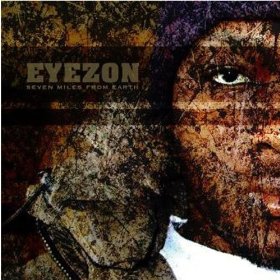Some days after hurricane Katrina had devastated New Orleans, Kanye West said on national television: “George Bush doesn’t care about black people.” Spike Lee probably will agree with him. The director, famous for his ringside NY Knicks seat and his hypercritical attitude towards the treatment of America’s black minorities, recently made public his latest documentary “When The Levees Broke: A Requiem In Four Acts.” It portrays how Katrina exposed the massive failure of authorities and their unjust behavior towards the predominant black population of New Orleans, before and after the lethal hurricane.
The upcoming artist Eyezon from San Diego shares similar views with the famous, militant film maker. If his debut album,”7 Miles From Earth,” was a book, it would read like a catalogue of the suffering ‘his people’ have endured, as he calls them so endearingly. The responsibles, time after time, are referred to as ‘they’ or ‘the man.’ There is no mistake who he is talking about.
There is a good reason for his, at times, bitter thoughts about the situation of black minorities in the United States and black majorities in Africa. Eyezon was raised in the violent townships of Johannesburg, South Africa, where segregation, violence, and death are everyday factors. No matter how hard American MC’s try to prove they are ‘street,’ they probably wouldn’t last for five minutes in these hellholes of the world. Eyezon survived these harsh surroundings by believing in God, but mostly by moving to his ‘country of Neo,’ known to most of us the United States.
“It’s a new day
I’m on a train, like Gladys
Walking over loops and beats by fat tactics
I practice magic, and think quicker
Looking for the God in me
Smoking weed, drinking liquor
Notice gotta be more to the picture
My girl, my niggas
Plus my brothers and my sisters
Life is a Kodak moment
I’m constantly caught
Getting lost in my thoughts
That I constantly sought”
This lyric snippet, taken from the song “Restoration,” is an example of Eyezon’s contemplations, but also showcases the talents of his steady producer. There is no mention of his identity on the record company website. The only name mentioned is the producer of his next project “That’s The Name.” I will assume that this Young Sean is the man behind “7 Miles From Earth,” but I am not sure of it at all. Like the MC, this ‘unknown soldier’ is a great admirer of black American heroes, and lets that admiration show through tapping into America’s most influential musical icons in his songs. “Restoration” contains a contemplative guitar solo with a moving quality, but Stevie Wonder’s voice gives it an extra elevating effect. Nina Simone’s unusual vibrant voice is sampled to support the piano in “The Times Are Changing.” No voice pitching on this album, just old-fashioned vocalists. It is a breath of fresh air after hearing the Chipmunk parade used by so many producers in the industry.
His best achievement on this album is the rumbling “Get Facts.” A heavy breathing sound precedes an organic, thumping bass interwoven with featherlight piano keys. Bass is supposed to sound dirty, and this one sounds like a herd of African elephants trampling the muddy soil. “Get Facts” is, yet again, a showcase for Eyezon to sum up his difficulties with the system he exists in:
“Black men and black women
Trapped from the beginning
Tapping to the system
That sold us as slaves
And gave us religion
What’s the vision?
Fathers are all in prison
Children are left on the streets
To raise themselves, no supervision
Black women
Working to make a living
Living to make the work and sweat
So beautiful as God-given”
Eyezon delivers his lyrics with a religious conviction, but is also blessed with a great sense of timing. He has the ability to alter his rhyme schemes constantly, but without losing sight of the cadence of the mystery man’s beats. His voice isn’t the most unusual, but sounds credible and snappy, like he wants to chew off the words which just left his mouth. If you take into account English is not his native language, you must admire the fact there is no apparent accent. Africans are always ridiculed for their peculiar use of the English language, but Eyezon sounds as American as humanly possible.
“7 Miles From Earth” has an abundant quality for a debut release, but it also radiates seriousness. The album’s gravity is so heavy, it almost topples over by its own weight. Eyezon’s frame of mind doesn’t allow any light snacks in between his heavy meals, so get some Alka- Seltzers at the drug store before listening. “So Far Away” deals with a mistress out of reach, “Black Water” is about the stigmatic use of the word ‘black,’and “Move the Motionless” comes forth out of his desire to change the world.
Being serious is not a bad thing, but that state of mind, in combination with the constant references to the religious background, can get quite annoying after a couple of songs. There is no wrongdoing in being proud of your heritage, but a little restraint wouldn’t do any harm. I sometimes get the feeling Eyezon is preaching instead of rhyming.
This talented African-Californian could be referred to as a Dead Prez/Talib Kweli hybrid. I am not exactly sure his lyrics will generate a huge fan base, but he definitely should get some more exposure than he is getting right now. His album is available for free download at the record company’s website, so give him a chance.

